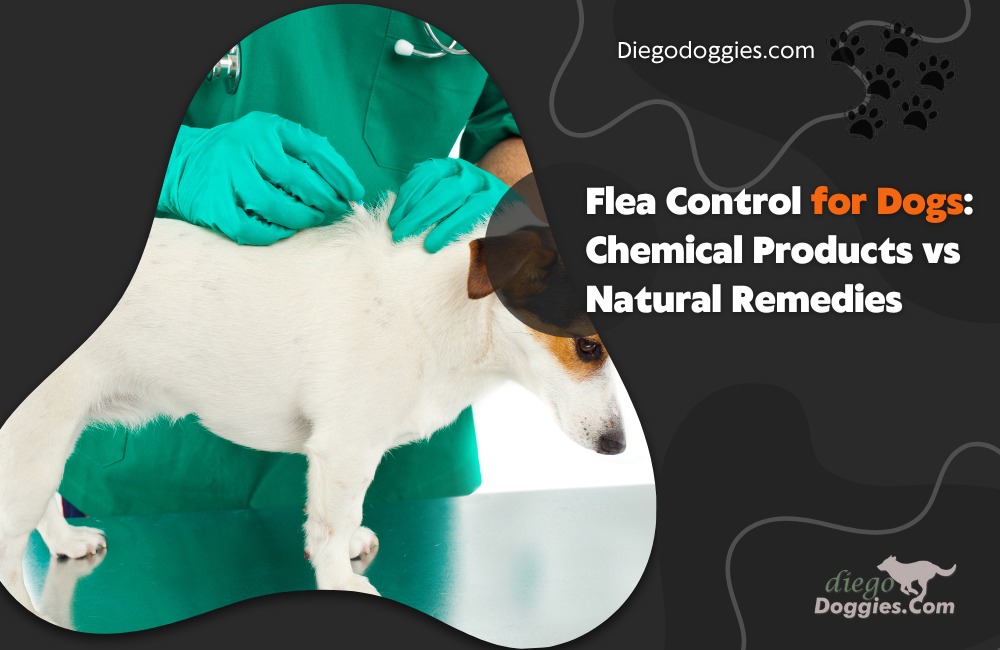There are many products on the market that claim to be able to control fleas on dogs, but the truth is that most of these products are based on chemicals that can be harmful to your pet. Some dogs may even have adverse reactions to these chemicals. If you’re looking for a natural remedy to control fleas on your dog, there are a few things you can try.
1. Flea Control for Dogs:- The Problem
Fleas are a common problem for dogs and their owners. Fleas can cause your dog to itch and scratch, which can lead to further skin problems. Fleas can also transmit diseases to your dog, so it’s important to get rid of them as soon as possible.

2. Chemical Products for Flea Control
The most common method of flea control for dogs is to use chemicals. These products usually come in the form of sprays or powders, and they work by killing the fleas on your dog’s body. While these products can be effective, they can also be harmful to your dog if used incorrectly.
Some dogs may also have adverse reactions to the chemicals in these products, so it’s important to read the label carefully and follow the directions carefully.
3. Why Some Dogs React Adversely to Chemicals
It’s not entirely clear why some dogs react adversely to chemicals, but it is thought that the chemicals may be irritating to their skin, or they may be allergic to them. If you’re concerned that your dog may have an adverse reaction to a chemical flea control product, talk to your vet about other options.
4. Herbal Remedies for Flea Control
There are a few herbal remedies that have been traditionally used to control fleas on dogs. One of the most popular is rosemary. Rosemary can be added to your dog’s bath water, or you can make a rosemary Flea Rinse by boiling a handful of rosemary leaves in a quart of water for 15 minutes.
Let the mixture cool and then use it to rinse your dog’s coat after shampooing. Other herbs that have been traditionally used for flea control include mint, sage, and thyme.
5. Efficacy of Natural Flea Control Methods
While there is no scientific evidence to support the efficacy of any of these traditional Flea control methods, some dog owners swear by them.
If you’re interested in trying a natural flea control method, talk to your vet about the best way to use it and be sure to follow the directions carefully. Remember, even natural remedies can be harmful if used incorrectly.
6. Comparison of Natural and Chemical Flea Control Methods
There is no clear winner when it comes to natural versus chemical Flea control methods. Each has its own advantages and disadvantages. Ultimately, the best Flea control method is the one that works best for you and your dog.
If you’re concerned about the potential side effects of chemical Flea control products, talk to your vet about natural Flea control options.
7. Cost Analysis of Flea Control Methods
Flea control products can range in price from a few dollars to over one hundred dollars. The cost of natural Flea control methods is usually much lower, although the effectiveness may vary. When choosing a Flea control method, be sure to consider both the cost and the efficacy.
8. Environmental Impact of Flea Control Methods
Flea control products that contain chemicals can be harmful to the environment. If you’re concerned about the impact of your Flea control method on the environment, talk to your vet about natural Flea control options.
9. Pros and Cons of Natural Flea Control Methods
Dog owners have many options when it comes to flea control. Chemical methods, such as spot-on and oral medications, are popular because they are effective and easy to use.
However, some dog owners prefer to use natural methods, such as essential oils, herbs, and home remedies. Here is a look at pros and cons of natural flea control methods:
Pros:
- Natural methods are safe for dogs and humans.
- They are often less expensive than chemical methods.
- They tend to be gentler on the skin and less likely to cause irritation.
- Some dog owners feel good about using natural products that are not harsh chemicals.
- Natural methods may be more effective in the long run because they build up the immunities of both the dog and the environment.
Cons:
- Natural methods can be time-consuming.
- They may require more frequent treatments.
- Some methods, such as home remedies, may not be as effective as chemical treatments.
- Dog owners may need to experiment with different natural methods to find one that works well for their dog. Natural treatments may not be available in all areas.
10. Conclusion
Fleas can be a big problem for both dogs and their owners. While there is no one perfect Flea control method, there are a variety of options available. Talk to your vet about the best Flea control method for your dog and be sure to follow the directions carefully. Remember, even natural remedies can be harmful.
Related Contents
- 11 Important Tips To Help Your Dog Lose Weight and Become Healthier
- 12 Swimming Safety Tips for Your Dog
- 14 Ways to Help Keep Your Dog Happy and Healthy
- 5 Reasons Why Your Dog Needs a Dog Life Jacket
- A Step-By-Step Guide To Removing A Tick From Your Dog
- Collars Versus Harnesses for French Bulldogs
- Cutting a Dog’s Nails: How to Prevent Bleeding
- Dachshund Health Problems and How to Prevent Them
- Dog Pregnancy Guide: Signs, Care And Preparation
- Dog Teeth Cleaning in San Diego: The Pros and Cons
- Flea Treatment for Dogs- What Is the Best Flea Treatment For Dogs
- Guide For Preventing Hip Dysplasia In Golden Retrievers
- How a Dog Microchip Works
- How Much Exercise Does a Dog Need
- How To Avoid Dog Heatstroke
- How to Choose the Right Dog Daycare in San Diego
- How To Clean Your Dog’s Teeth Yourself – And Is It Necessary
- How To Cut An Uncooperative Dog’s Toenails
- How to Get a Dog to Stop Barking At Night
- How to Get Rid of Fleas on Your Dog
- How to Help a Dog with Allergies: Causes, Signs, Treatment


1 thought on “Flea Control for Dogs: Chemical Products vs Natural Remedies”